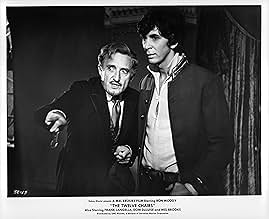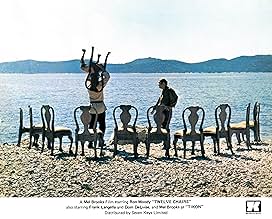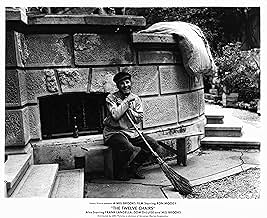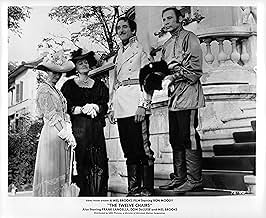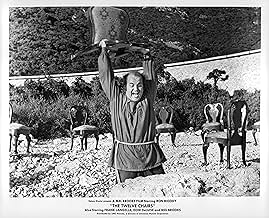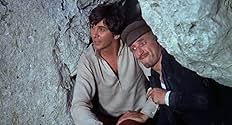NOTE IMDb
6,4/10
7,4 k
MA NOTE
Ajouter une intrigue dans votre langueIn 1920s Soviet Russia, a fallen aristocrat, a priest and a con artist search for a treasure of jewels hidden inside one of twelve dining chairs, lost during the revolution.In 1920s Soviet Russia, a fallen aristocrat, a priest and a con artist search for a treasure of jewels hidden inside one of twelve dining chairs, lost during the revolution.In 1920s Soviet Russia, a fallen aristocrat, a priest and a con artist search for a treasure of jewels hidden inside one of twelve dining chairs, lost during the revolution.
- Réalisation
- Scénario
- Casting principal
- Récompenses
- 1 victoire et 1 nomination au total
Andréas Voutsinas
- Nikolai Sestrin
- (as Andreas Voutsinas)
Mladen 'Mladja' Veselinovic
- Peasant
- (as Mladja Veselinovic)
Petar Banicevic
- Sergeant
- (non crédité)
Dejan Cavic
- Orator
- (non crédité)
Avis à la une
In his lifetime Mel Brooks has created many motion pictures which have established him as an artistic genius. "The Twelve Chairs" is another milestone for him. From the very beginning of this film, to its ending, there is a sense of serious, but humanistic brilliance. The era is the aftermath of the Russian Revolution and a dying woman wants to clear her conscience and reveal her greatest sin. As thousands of the nobility are fleeing for their lives, she decides to hide her family's fortune inside the lining of a set of handcrafted chairs. That secret is her dying revelation and is said unfortunately into more than one set of ears. This initiates a mad dash for the lost treasure. Seeking the cache of jewels are three intrepid, but greedy set of characters. The first is incredibly talented Ron Moody who adroitly and brilliantly plays the legitimate, greedy and opportunistic son, Ippolit Vorobyaninov. Once a Marshall of the nobility, he is now reduced to a minor banking clerk and opportunistic son-in-law. Frank Langella is superior as Ostap Bender, a handsome, street-wise, traveling Gypsy, who also wants in on the treasure hunt. Finally there is Dom DeLuise who plays Father Fyodor, an Orthodox but impoverished monk who believes, God will help him find the elusive chair first. What the trio soon discover is that the chair is one of Twelve which have been scattered across the vast twelve thousand miles of Russia. If Mel Brooks sought to create an amusing memorable movie, he succeeded. By the time one reaches the end of this film, we realize . . . . a Classic has been born. ****
"Hope for the best, expect the worst", as the title song goes, is exactly how I felt when I picked up my copy. Having read the original Russian novel and being a fan of Mel Brooks, I was curious how the two would come together. I was rather apprehensive, knowing how Russian literature usually suffers in translation, but hopeful that Brooks would somehow make something of it anyway. The film disappoints on both counts - there's precious little of the original in it, and Brooks isn't at his best here either. Moody is actually OK as Vorobyaninov, but the casting of Langella as Bender is just plain wrong, as he cannot possibly convey the depth and subtlety of the original character. Langella alone is enough to kill this film for anyone familiar with the book. None of the uproarious humor of the novel is anywhere to be found, while the few semi-funny visual gags are merely typical Brooks slapstick and have nothing to do with the source material. And even those aren't among Brooks' best. However, having expected the worst, I wasn't exactly disappointed. An OK little comedy, if you don't expect too much. If you want more, read the book.
The Twelve Chairs Years after the Russian Revolution in 1917, the former aristocrat Ippolit Matveevich Vorobyaninov (Ron Moody) is informed by his terminal mother-in- law that she has hidden her jewels in a the upholstery of chair from a set of twelve chairs. The Orthodox Father Fyodor (Dom DeLuise) also hears and leaves the Church to seek out the treasure. Vorobyaninov travels to his old house and meets his former servant Tikon (Mel Brooks) that adores him. He learns that the chairs had been expropriated by the new government and sent to another place. However the con artist Ostap Bender (Frank Langella) convinces Vorobyaninov to be his partner. They travel to Moscow where Ostap succeeds in luring Father Fyodor, telling that the chairs belong to the Engineer Bruns (David Lander), who has very similar chairs and lives with his wife in Siberia. Will Vorobyaninov and Ostap find the twelve chairs?
"The Twelve Chairs" is a typical Mel Brooks' comedy with the usual type of humor with a satire to the Russian Revolution. This comedy is also the debut of Frank Langella in the cinema. Fans of Mel Brooks will certainly like it, but who is not his fan may not find this comedy entertaining. My vote is six.
Title (Brazil): "Banzé na Rússia" ("Mess in Russia")
"The Twelve Chairs" is a typical Mel Brooks' comedy with the usual type of humor with a satire to the Russian Revolution. This comedy is also the debut of Frank Langella in the cinema. Fans of Mel Brooks will certainly like it, but who is not his fan may not find this comedy entertaining. My vote is six.
Title (Brazil): "Banzé na Rússia" ("Mess in Russia")
Knowing that Mel Brooks usually makes the silliest movies possible, it's a surprise that he directed the lightweight comedy "The Twelve Chairs". It portrays a former Czarist (Ron Moody, happy birthday!) and a young soldier (Frank Langella) looking for some jewels hidden in chairs in the Soviet Union in the 1920s. I will say that not much really happens throughout much of the movie, but it is a famous part of Russian literature. I haven't read the novel, but the movie is worth seeing, if only as a look at Brooks's early career. Also starring Dom DeLuise and Brooks in a small role.
Epilepsy...
Epilepsy...
THE TWELVE CHAIRS is a different kind of Mel Brooks comedy. Its story, from a Russian novel by Ilf and Petrov, will seem very tasteful and human to those who are acquainted with Brooks' usual raunchiness. This movie is a nice change. Ron Moody and Frank Langella star, with Dom DeLuise and a special appearance by Mel Brooks as Tikon.
Le saviez-vous
- AnecdotesMel Brooks had problems with Yugoslavian extras who didn't speak English. In one scene, extras playing museum guards were supposed to walk through a museum, ringing hand bells and shouting, "Closing time! Closing time!" Instead, the extras misunderstood and shouted, "Cloakie Bye! Cloakie Bye!" Brooks decided "Cloakie Bye" was funnier, so he left it in the movie.
- GaffesDuring the chase through the train yard, a modern era bus can be seen passing in the background.
- Citations
Ostap Bender: [after yet another failure] Remember the famous Russian proverb: "The hungrier you get, the tastier the meal." On the other hand, the French have a proverb: merde!
- Crédits fousIn the opening credits the title of the movie is showed in Russian first (even with a typographic error 'Dvenadzat' stchlyev'), then it changes into the english title. The same happened at the end of the credits with the words "The end" (Konez), first cames the Russian word, than the english translation.
- ConnexionsFeatured in Sneak Previews: Take 2: Who's Funnier: Mel Brooks or Woody Allen? (1980)
- Bandes originalesHope for the Best, Expect the Worst
Music by Johannes Brahms ("Hungarian Dance No. 4 in F# minor") and lyrics by Mel Brooks
Meilleurs choix
Connectez-vous pour évaluer et suivre la liste de favoris afin de recevoir des recommandations personnalisées
- How long is The Twelve Chairs?Alimenté par Alexa
Détails
Box-office
- Montant brut aux États-Unis et au Canada
- 1 806 258 $US
Contribuer à cette page
Suggérer une modification ou ajouter du contenu manquant

Lacune principale
By what name was Le mystère des douze chaises (1970) officially released in India in English?
Répondre

